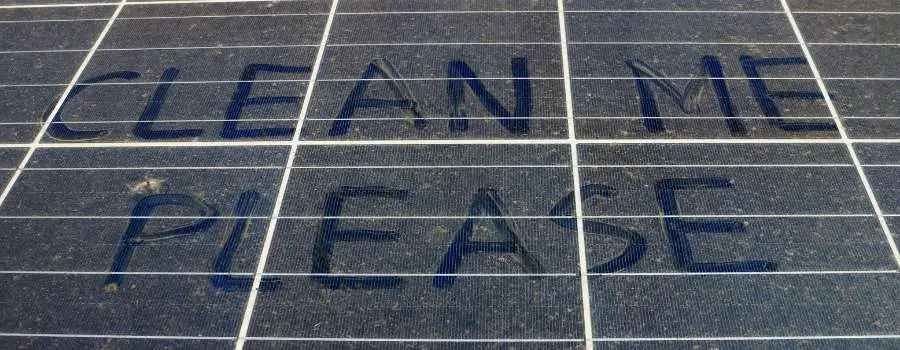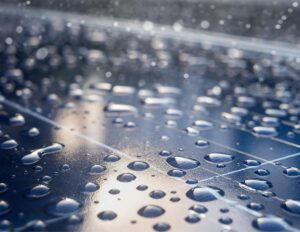
Solar panels are a fantastic investment for anyone who wants to reduce their carbon footprint and save money on their electricity bills. However, to keep your solar panels operating at peak efficiency, it is essential to keep them clean, but how?
To clean solar panels, turn off the system and then gently rinse panels, then scrub softly without applying too much pressure. Rinse off soap thoroughly and use a squeegee to dry, preventing mineral deposits. Regularly inspect for damage and clean every six months or as needed.
Okay, that’s the short and direct answer…down below we’ll get into the nitty-gritty and answer some related questions!
Table of Contents
How to Properly Clean Solar Panels on a Roof
Cleaning dirty solar panels is important to maintain their efficiency and prolong their lifespan. Here’s a detailed guide on how to properly clean solar panels:
- Safety First: Ensure safety by turning off the solar panel system before cleaning. If your panels are installed on the roof, use a sturdy ladder, wear a safety harness, and take necessary precautions to prevent falls.
- Choose the Right Time: Clean your solar panels during the early morning or late evening to avoid both the heat of the sun and potential damage to the panels. Avoid cleaning during peak sun hours.
- Gather Necessary Tools: You’ll need a soft brush or a non-abrasive sponge, a squeegee with a plastic blade, a hose with a suitable nozzle for gentle water flow, and a bucket of soapy water. Use mild detergent – harsh chemicals can damage the panels.
- Initial Rinse: Gently rinse the panels with plain water to remove loose dirt and debris. This step helps prevent scratching the panels during the cleaning process.
- Gentle Scrubbing: Dip the soft brush or sponge in the soapy water and gently scrub the surface of the panels. Start from the top and work your way down, ensuring you cover all areas. Be careful not to apply too much pressure.
- Rinsing Off Soap: After scrubbing, rinse the panels thoroughly with clean water. Ensure all soap and residue are washed off, as these can leave streaks and reduce panel efficiency.
- Drying the Panels: Use a squeegee to remove excess water. This helps prevent mineral deposits from the water from drying on the panels. If your water is hard, consider using deionized water for rinsing.
- Inspect for Damage: After cleaning, inspect your panels for any signs of damage, such as cracks or discoloration. If you notice any damage, contact a professional for advice or repairs.
- Regular Maintenance: Regularly check and clean your panels, ideally every six months, to ensure optimal performance. The frequency may vary based on your location and the amount of dust or debris your panels are exposed to.
- Professional Cleaning: If your panels are difficult to access or if you’re uncomfortable doing the cleaning yourself, consider hiring a professional solar panel cleaning service.
How Often
Generally, it’s recommended to clean your solar panels every six months to ensure optimal performance. However, in areas with high dust, pollen, or bird activity, more frequent cleaning, possibly every 3-4 months, may be necessary.

But, if you live in an area with frequent rainfall, natural rainwater can help keep the panels clean, potentially reducing the need for manual cleaning.
It’s also important to monitor the energy output of your panels; a noticeable decrease in efficiency might indicate the need for a proper cleaning session.
Regular inspections will help determine the right cleaning schedule for your specific situation.
Most Effective Methods
The most effective way to clean dirty or cloudy solar panels is with water, a little bit of dish soap, and a large sponge similar to the one you’d use to clean a car.
What to be Cautious of
Dust and Debris
Before wiping down your panels you might want to use a garden hose to spray down your panels to remove dust and debris. If you try to wipe them clean without water you run the risk of leaving micro scratches, which can begin to reduce the efficiency of your panels.
Water Pressure
You’ll also want to make sure you don’t use anything more powerful than a standard garden hose to spray down your solar panels.
A power washer will be way too harsh and can cause scratches, cracks, and knock wire connections loose. The powerful spray could also cause large pieces of debris, such as twigs and tree nuts to become wedged in the framing of your panels.
Soap
Soapy water is really the best cleaning solution you can use. Anything more abrasive than that can potentially eat away at the surface of your panels and create scratches and pockmarks. Some cleaners can also leave a film behind if not thoroughly cleaned off which can begin to reduce solar efficiency.
Efficiency Loss
As much as 30% efficiency could be lost if solar panels aren’t cleaned. Granted, wind and rain will help keep some of the dust from settling, but things such as bird droppings and tree sap take a little more elbow grease to get rid of (1).
While the money saved trickles in month after month, year after year remember that solar panel efficiency follows a similar pattern. A small amount of dust, hardly any loss of efficiency…but over the years, that dust cakes on and that little bit of lost efficiency compounds.
How Much to Clean Solar Panels
If you decide to clean your panels yourself it’s possible to pay nothing if you already have the necessary tools. If not then you will spend about $75, give or take. To hire a professional, then you can expect to pay up to $10 per panel, or $200 for 20 solar panels.
DIY
Cleaning dirty or cloudy solar panels by yourself is generally the most cost-effective method. The primary expense in DIY cleaning is the initial investment in equipment. This includes:
- Soft Brush or Non-Abrasive Sponge,
- Squeegee
- Hose with a Nozzle
- Bucket
- Ladder
- Safety Equipment
The total DIY cost for these items can range from $30 to $150, depending on the quality and brand of the tools.
However, these are one–time expenses; once you have the equipment, the only recurring cost is for mild detergent, which is minimal.
Hiring a Professional
Hiring a professional service to clean your solar panels is more expensive but offers the advantage of expertise and safety, especially for hard-to-reach panels. The cost varies depending on the number and accessibility of your solar panels, and your geographic location.
On average, professional cleaning services charge between $3 to $10 per panel. For a typical home solar system with around 20 panels, this translates to a range of $60 to $200 per cleaning session.
Some companies offer annual maintenance packages that include cleaning and inspection, which can be more cost-effective. Additionally, professional cleaners often have specialized equipment and techniques to efficiently and safely clean the panels.
Cleaning Solar Panels from the Ground
Cleaning solar panels from the ground is a safer alternative to climbing onto the roof, especially for homeowners who are not comfortable with heights or do not have the necessary safety equipment.
Equipment Needed
- Long-handled, soft-bristle brush: This will allow you to reach the panels from the ground.
- Hose with an appropriate nozzle: To provide a gentle spray of water to the panels.
- Bucket filled with mild soapy water: Use a gentle detergent to avoid damaging the panels.
Method
- Safety Precautions: Ensure that the solar panel system is turned off before cleaning. Avoid cleaning during peak sunlight hours to reduce the risk of heat-related damage to the panels or yourself.
- Initial Rinse: Use the hose to gently rinse the surface of the panels. This removes loose dirt and debris and prevents scratching during the scrubbing process.
- Applying Soap: Dip the long-handled brush into the soapy water and apply the soap to the panels. Be gentle to avoid any damage.
- Scrubbing: Gently scrub the surface of the panels with the brush. Use a side-to-side motion and cover the entire surface area. Since you’re working from the ground, it might be challenging to see or reach certain spots. Take your time and adjust your position as needed to ensure thorough cleaning.
- Rinsing Off Soap: Thoroughly rinse the panels with your hose to remove all soap and residue. Leftover soap can leave streaks and may affect the efficiency of the panels.
- Drying: Although not always necessary, you can dry the panels using a clean, soft cloth attached to the long-handled brush. Alternatively, you can let them air dry.
- Regular Inspection: Regularly inspect your solar panels from the ground for any noticeable signs of dirt buildup, bird droppings, or debris. This will help you determine the frequency of cleaning required.
- Consider a Cleaning Kit: There are solar panel cleaning kits available in the market specifically designed for ground-level cleaning. These kits often include extendable brushes and hoses to make the process easier and more efficient.
- Professional Help: If the panels are too high or if you’re unsure about doing it yourself, consider hiring a professional cleaning service.
Frequently Asked Questions
Will Rain Clean Solar Panels?
Letting nature rain down on your panels to clean them isn’t the best option. While it will get a large amount of dirt and leaves off your panels, the dust in the rain will settle and dry on your panels. Rain also isn’t strong enough to wash away caked-on or lodged debris.
Can You Clean Solar Panels With Windex?
Cleaning solar panels with Windex or other glass cleaner is not recommended. The problem is your average household cleaner contains ammonia which can be damaging to certain types of photovoltaic cells on the panel surface.
Is it Safe to Clean Solar Panels by Myself?
Cleaning solar panels yourself can be safe if you take the proper precautions, especially when working on the roof. Use a sturdy ladder, safety harness, and ensure the solar system is turned off before cleaning. If you’re not comfortable with heights or the panels are difficult to access, it’s best to hire a professional.
Can I Clean Solar Panels with Tap Water?
You can use tap water to clean solar panels. However, if you have hard water, it’s advisable to use deionized water or a 50/50 mix of white vinegar and water to prevent mineral deposits from forming on the panels.
